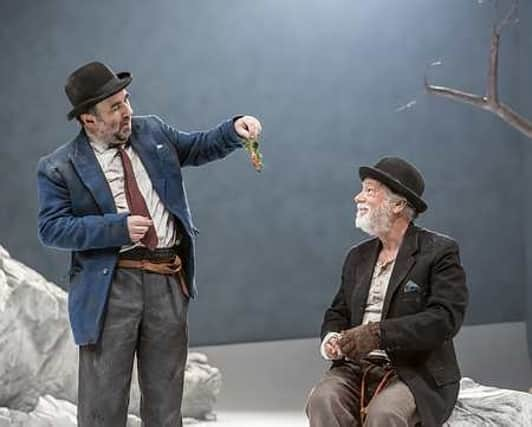Waiting for Godot, Sheffield Crucible until February 27.


His English teacher at school told him she went to that first performance — then seen as subversive to the traditions of the theatre — where it got a deserved standing ovation; albeit there were only six people in the audience.
Beckett’s work has come a long way since.
His plays are now performed widely and regularly and Beckett himself is rightly regarded as the leading modernist playwright.
Advertisement
Hide AdAdvertisement
Hide AdBeckett’s work belongs to the “Theatre of the Absurd”, a type in which the universe and human existence are depicted as without purpose and irrational. It’s the absurdity of it all which makes it funny.
So in Waiting for Godot, a tragi-comedy written in 1952, two tramps are waiting for someone who never turns up — a running gag throughout.
Director Charlotte Gwimmer’s Godot makes for a powerful exploration of human beings’ daily struggle to find meaning in an apparently meaningless world and to find comradeship in a cruelly unequal society, although lacking any answer.
Godot seems very relevant for today.
Apparently, Gwimmer has said she thought about setting the play among the refugees of Calais and although the play is abstract, for me, the real world is never far away.
Advertisement
Hide AdAdvertisement
Hide AdBeckett uses gallows humour to portray the separation of human beings from each other and reflects an alienated experience of the political and economic system we live under.
Lorcan Cranitch as weak-bladdered Vladimir and Jeff Rawle, white-bearded as Estragon, make an outstanding double act, bringing out the music hall, cross-talking comedy and pathos that has long been recognised in Beckett’s work. The famous three hats scene is a gem of classic comic timing.
Cranitch gives his Irish “Didi” a lyrical, battered dignity, maintaining his optimism in the face of dire adversity, while Rawle’s “Gogo” is a mixture of gentle grumpiness and fear — not least because of the nightly beatings he receives at the hands of strangers — and he can't even get his boots off.
Richard Cordery’s plum-voiced slaveowner brilliantly portrays the savage cruelty of the people in power, matched by Bob Goody’s amazingly otherwordly slave Lucky, who delivers a rambling, incoherent speech of unbearable sadness.
Simon Daw’s bleached, bleak design sets the tone, with two grey plastic-looking boulders — one looking like a beached whale — and an uprooted tree.
Don’t wait, go and see this modern classic.